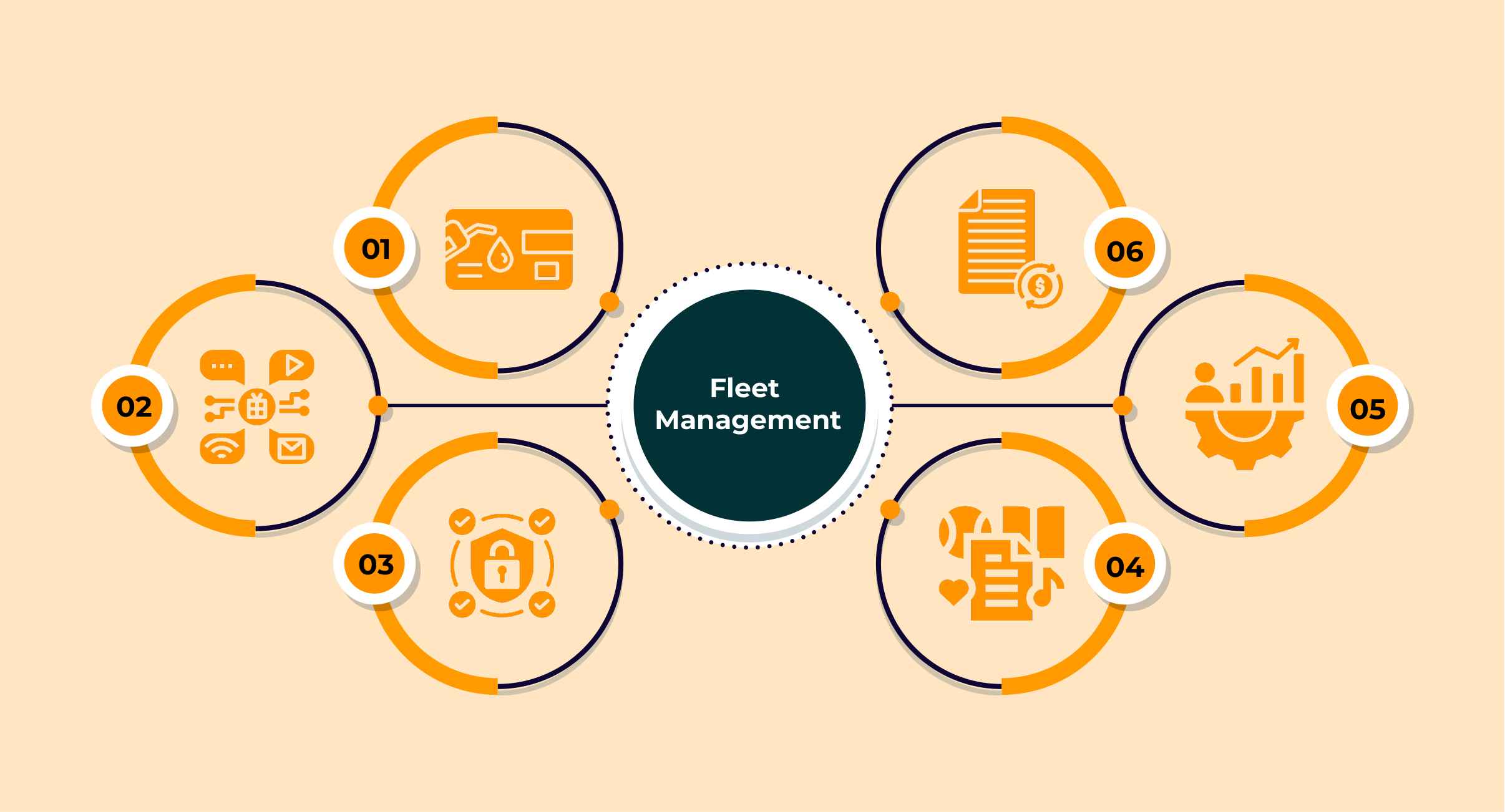Here are ten must-know tips to help you manage fleet vehicles and improve fleet management instantly.
- 1. Embrace Fleet Management Software
- 2. Implement GPS Tracking for Route Optimization
- 3. Schedule Regular Maintenance to Reduce Downtime
- 4. Enhance Safety with Driver Training Programs
- 5. Leverage Data Analytics for Informed Decision-Making
- 6. Optimize Fuel Consumption to Lower Costs
- 7. Use Telematics to Monitor Vehicle Health
- 8. Implement a Fleet Safety Policy
- 9. Track and Analyze Fleet Costs
- 10. Focus on Sustainable Fleet Practices
- How to manage fleet vehicles
- Fleet Management Tips
- Additional Considerations for Fleet Management
- Conclusion
1. Embrace Fleet Management Software
Investing in fleet management software is a game-changer for any business. This software provides real-time data and analytics on your fleet operations, helping you make informed decisions. From tracking vehicle locations to monitoring fuel consumption, fleet management software offers a comprehensive solution for managing your fleet efficiently.
It also enables better scheduling, maintenance management, and reporting, which are essential for ensuring your vehicles operate at peak performance. According to a report by MarketsandMarkets, the global fleet management market is expected to grow from USD 19.9 billion in 2020 to USD 34.0 billion by 2025, highlighting the importance of such tools in the industry.
Related Article: Automated Reporting – Work Smartly with Cab management Software
2. Implement GPS Tracking for Route Optimization
GPS tracking is essential for effective fleet management. By utilizing GPS technology, fleet managers can monitor vehicle locations in real-time, allowing for better route optimization. Optimizing routes not only reduces fuel consumption but also enhances fleet performance by minimizing unnecessary mileage.
According to a study by Geotab, businesses that use GPS tracking experience a 15-20% increase in productivity and a 10-15% reduction in fuel costs, making it a must-have for any fleet management strategy.
Related Article: How On-Demand Taxi Software Can Help You Fix your Dispatching Problems
3. Schedule Regular Maintenance to Reduce Downtime
Preventative maintenance is key to ensuring your vehicles are always in top condition. Implementing a regular maintenance schedule helps address potential issues before they become major problems, reducing downtime and improving fleet efficiency by keeping vehicles on the road longer.
This proactive approach is a standard practice in effective fleet management to avoid costly repairs and ensure safety.
Related Article: Super App Development – All In One Solution
4. Enhance Safety with Driver Training Programs
Investing in driver training programs can significantly improve fleet safety. Well-trained drivers are less likely to be involved in accidents, which reduces repair costs and insurance premiums.
Incorporating safety protocols and regular training sessions leads to safer, more efficient fleet operations. Addressing driver error through continuous training is crucial for reducing risks.
5. Leverage Data Analytics for Informed Decision-Making
How to Improve Fleet Management is closely tied to effective data-driven decision-making, which is essential for successful fleet management strategies. By analyzing data collected from your fleet management software, you can identify trends, monitor performance, and make strategic adjustments to improve overall efficiency.
Data analytics allows you to track key performance indicators (KPIs) like fuel consumption, maintenance costs, and vehicle utilization, leading to informed decisions that boost fleet performance.
6. Optimize Fuel Consumption to Lower Costs
Fuel is one of the highest operating costs for any fleet. To manage fleet vehicles more effectively, focus on strategies to optimize fuel consumption. This includes adopting fuel-efficient driving practices, maintaining proper tire pressure, and choosing routes that minimize idle time.
Improving fuel efficiency can significantly reduce costs, making it an essential focus for any fleet management strategy. Additionally, using fuel management software can provide insights into fuel usage patterns, helping fleet managers make data-driven decisions to reduce consumption.
7. Use Telematics to Monitor Vehicle Health
Telematics systems provide valuable insights into the health of your fleet. By monitoring engine performance, fuel usage, and other critical metrics, you can address potential issues early and ensure your vehicles are running at peak efficiency.
Telematics also helps in tracking driver behavior, which can be used to implement corrective actions and improve overall fleet safety. The growing importance of telematics in fleet management underscores its role in enhancing fleet performance.
8. Implement a Fleet Safety Policy
A well-defined fleet safety policy is essential for minimizing risks and ensuring compliance with industry regulations. This policy should outline safety protocols, driver responsibilities, and procedures for reporting and addressing safety concerns.
Companies with strong safety policies experience fewer accidents and lower associated costs, highlighting the importance of this practice. Incorporating telematics data into your safety policy can help identify high-risk drivers and provide targeted training to improve safety.
9. Track and Analyze Fleet Costs
Keeping a close eye on your fleet costs is crucial for optimizing operations. Use fleet management software to track expenses related to fuel, maintenance, insurance, and other operational costs.
Analyzing these costs allows you to identify areas where you can cut expenses and improve efficiency. Actively tracking and managing fleet costs can lead to a significant reduction in the total cost of ownership (TCO). Integrating cost tracking with your overall fleet management strategy helps identify inefficiencies and take corrective actions.
10. Focus on Sustainable Fleet Practices
Sustainability is becoming increasingly important in fleet management. Consider incorporating electric or hybrid vehicles into your fleet, implementing green driving practices, and reducing your overall carbon footprint. These sustainable practices not only benefit the environment but also improve fleet efficiency and reduce operational costs.
The adoption of electric vehicles in fleets is expected to increase significantly in the coming years, making sustainability a key consideration for future fleet management strategies. Additionally, many governments offer incentives for businesses that adopt sustainable practices, providing further motivation to go green.

How to manage fleet vehicles
Managing fleet vehicles effectively requires a combination of strategic planning, regular maintenance, and the use of advanced technology. To begin with, it’s essential to implement a preventative maintenance schedule to reduce downtime and extend vehicle lifespan.
This ensures that potential issues are addressed before they escalate, keeping your fleet operational and efficient. Driver training programs also play a critical role in fleet safety, as well-trained drivers are less likely to be involved in accidents, which can reduce repair costs and insurance premiums.
To understand How to Improve Fleet Management, leveraging data analytics is another vital component, enabling fleet managers to monitor performance, track key metrics, and make informed decisions that enhance overall efficiency.
Additionally, optimizing fuel consumption through fuel-efficient driving practices and proper vehicle maintenance can significantly lower operating costs. The use of telematics systems allows for real-time monitoring of vehicle health and driver behavior, further contributing to fleet efficiency and safety.
Incorporating a comprehensive fleet safety policy ensures that all drivers adhere to safety protocols, reducing the risk of accidents and compliance issues. Regularly tracking and analyzing fleet costs is also crucial, as it helps identify areas where expenses can be minimized, leading to a lower total cost of ownership.
Finally, adopting sustainable practices, such as integrating electric or hybrid vehicles, not only benefits the environment but also reduces operational costs, aligning your fleet management strategy with modern sustainability goals. By staying informed about emerging technologies and continuously optimizing your operations, you can manage your fleet vehicles effectively, ensuring long-term success.

Fleet Management Tips
-
Implement Automated Scheduling
Utilize automated scheduling tools to streamline the dispatching and routing process. This reduces the risk of human error and ensures that vehicles are used efficiently.
-
Conduct Regular Fleet Audits
Periodically review and audit your fleet operations to identify inefficiencies, such as underutilized vehicles or unnecessary expenses. This helps in optimizing the overall fleet performance.
-
Utilize Fuel Cards
Fuel cards can help monitor fuel expenses and usage, providing a detailed record that can be analyzed for cost-saving opportunities.
-
Encourage Eco-Driving
Promote eco-friendly driving habits among your drivers, such as smooth acceleration and braking, to reduce fuel consumption and minimize wear and tear on vehicles.
-
Establish Clear Communication Channels
Ensure there are clear communication channels between drivers and fleet managers. This facilitates quick response times to any issues that arise on the road.
-
Set Up a Rewards System
Introduce a rewards system to incentivize drivers to maintain fuel efficiency, safe driving records, and timely deliveries. Positive reinforcement can lead to better overall fleet performance.
-
Enhance Security Measures
Implement security protocols, such as installing GPS tracking and dash cams, to protect your fleet from theft and ensure driver safety.
-
Review Insurance Policies Annually
Regularly review your fleet’s insurance policies to ensure they offer adequate coverage at competitive rates. This can result in significant savings and better protection for your vehicles.
-
Outsource Non-Core Activities
Consider outsourcing non-core activities, such as vehicle maintenance or fuel management, to specialized service providers. This allows you to focus on your core business while ensuring your fleet is well-maintained.
-
Develop a Fleet Replacement Strategy
Plan for regular vehicle replacements to avoid high maintenance costs and downtime associated with aging vehicles. A well-timed replacement strategy ensures your fleet remains reliable and efficient.
Additional Considerations for Fleet Management
Beyond these ten tips of “How to Improve Fleet Management”, it’s essential to stay up to date with industry trends and emerging technologies that can further enhance your fleet management operations. For example, autonomous vehicles and predictive maintenance solutions can revolutionize fleet management by reducing labor costs, improving safety, and minimizing downtime. Staying informed about these and other emerging technologies will help fleet managers optimize their operations and maintain a competitive edge in the industry.
Conclusion
Improving fleet management is a continuous process that requires attention to detail and a commitment to optimizing every aspect of your operations. By implementing these ten must-know tips, you can Optimize Fleet Operations, reduce costs, and ensure your fleet is running as efficiently as possible. Effective fleet management is about making strategic decisions that drive long-term success.



